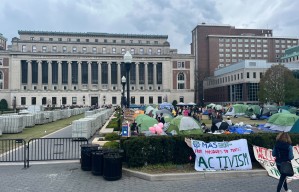The University of Alabama at Birmingham (UAB) health system has announced a temporary suspension of in vitro fertilization (IVF) treatments, citing concerns over potential legal repercussions.
This is in response to the Alabama Supreme Court ruling that frozen embryos are to be considered children, a verdict with far-reaching implications for the state's fertility treatment landscape.
The ruling actively extends legal protections typically afforded to children to frozen embryos, regardless of their location. This includes scenarios where embryos are stored in cryogenic facilities, a common practice in IVF procedures.
Alabama Supreme Court's Landmark Decision
Embryos are frozen and stored in the cryo store at Birmingham Women's Hospital fertility clinic on January 22, 2015 in Birmingham, England.
The court's decision emerged from a wrongful death lawsuit filed by couples whose embryos were inadvertently destroyed at a fertility clinic in 2020.
"We are saddened that this will impact our patients' attempt to have a baby through IVF," stated a spokesperson from the UAB health system, reflecting on the decision's immediate consequences. "But we must evaluate the potential that our patients and our physicians could be prosecuted criminally or face punitive damages for following the standard of care for IVF treatments."
The legal landscape surrounding fertility treatments in Alabama has been significantly altered by the court's ruling.
Previously, embryos resulting from IVF procedures were not explicitly covered under the state's Wrongful Death of a Minor Act. However, the recent decision expands the scope of this legislation to encompass embryos, extending legal personhood to these entities.
Chief Justice Tom Parker, concurring with the majority opinion, underscored the sanctity of human life from conception.
"Even before birth, all human beings have the image of God, and their lives cannot be destroyed without effacing his glory," Parker stated in his opinion.
Read Also: Michigan Transgender Woman Loses Case Against Ex-Boyfriend Over Argument on Refrigerated Testicles
Concerns About Reproductive Rights, IVF Access
The Alabama Supreme Court ruling raises questions about the legality of standard IVF practices, such as the storage and handling of embryos, potentially complicating the provision of fertility treatments in the state.
Elisabeth Smith, director of state policy at the Center for Reproductive Rights, highlighted the broader implications of the ruling in an interview with BBC.
"Not all [IVF] embryos are used, nor can they be. To enact legislation granting legal personhood to embryos could have disastrous consequences for the use of IVF - a science many people rely on to build their families," Smith cautioned.
The ruling could exacerbate existing disparities in access to fertility treatments, particularly for marginalized communities. Patients may face increased financial burdens and logistical challenges as they navigate a landscape reshaped by legal uncertainties.
Furthermore, the repercussions of this decision extend beyond Alabama's borders, eliciting concerns from medical experts and reproductive rights advocates nationwide.
While the ruling represents a significant development in the ongoing debate over reproductive rights, its journey to the US Supreme Court remains uncertain. Legal experts suggest that the decision's reliance on state law may limit its potential for federal review.
Related Article: Alabama Supreme Court Defines Frozen Embryos as 'Children' in Landmark Ruling








